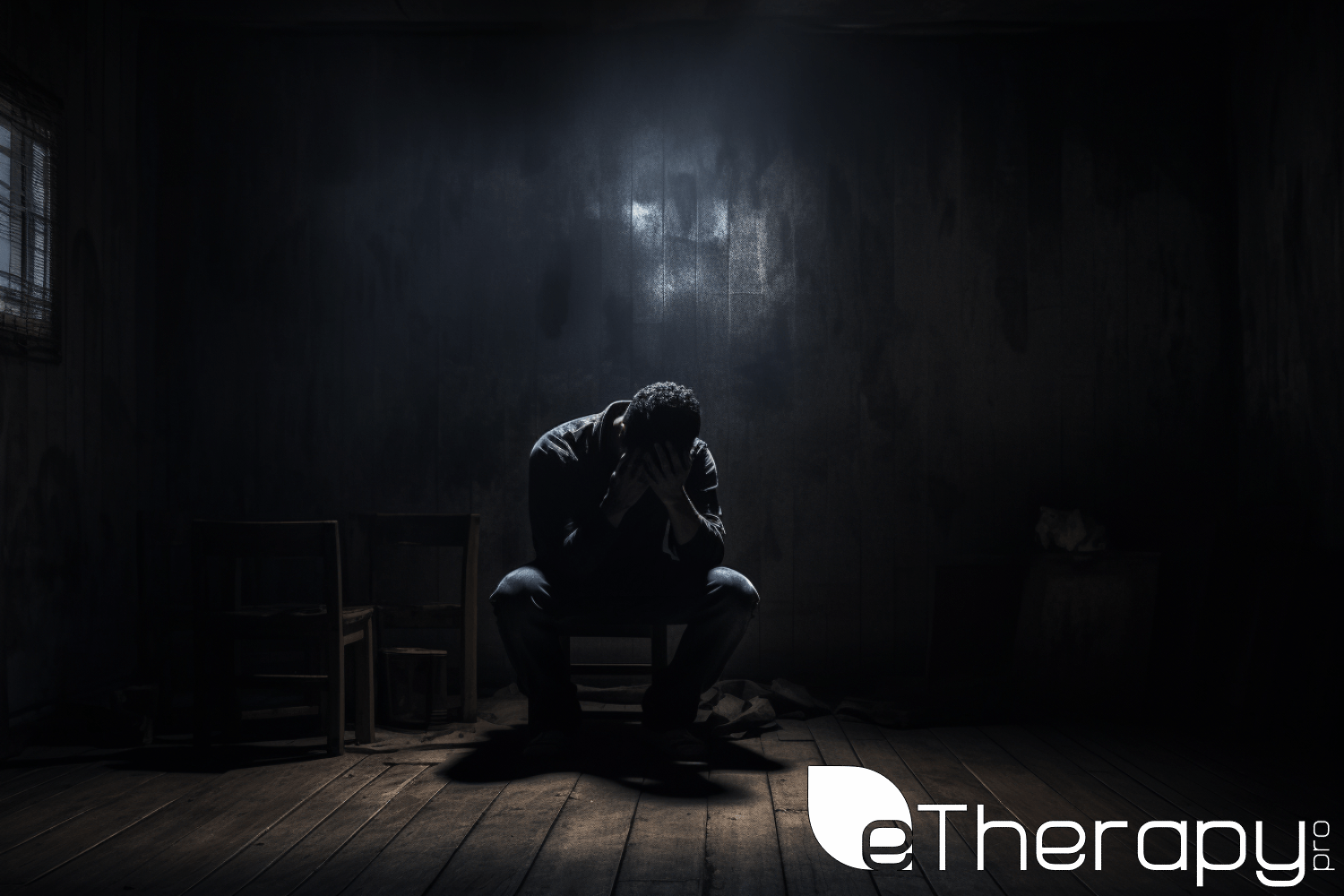 Intrusive thoughts, those sudden, unwelcome ideas or images that unexpectedly pop into our minds, can be disconcerting and often lead us to question our mental well-being. Have you ever found yourself shocked by a thought that seemed out of character, or troubled by repetitive ideas that you can’t seem to shake off? You’re not alone. This article aims to shed light on the nature of intrusive thoughts, explaining why they occur and how common they are. We’re here to reassure you that experiencing these thoughts is a normal part of human psychology. They don’t define your character or your moral compass. Understanding and normalizing these thoughts is crucial in learning to manage them effectively. Our goal is to provide you with insight and strategies to handle these thoughts without distress, and to highlight when it might be time to seek professional help, such as services offered by eTherapyPro.
Intrusive thoughts, those sudden, unwelcome ideas or images that unexpectedly pop into our minds, can be disconcerting and often lead us to question our mental well-being. Have you ever found yourself shocked by a thought that seemed out of character, or troubled by repetitive ideas that you can’t seem to shake off? You’re not alone. This article aims to shed light on the nature of intrusive thoughts, explaining why they occur and how common they are. We’re here to reassure you that experiencing these thoughts is a normal part of human psychology. They don’t define your character or your moral compass. Understanding and normalizing these thoughts is crucial in learning to manage them effectively. Our goal is to provide you with insight and strategies to handle these thoughts without distress, and to highlight when it might be time to seek professional help, such as services offered by eTherapyPro.
You don’t have to control your thoughts. You just have to stop letting them control you. – Dan Millman
Understanding Intrusive Thoughts
Intrusive thoughts, often bewildering and unsettling, are a common but widely misunderstood aspect of mental experience.
What Are Intrusive Thoughts?
Intrusive thoughts are spontaneous, often unwanted thoughts or images that can abruptly enter one’s consciousness. They can be jarring and diverse in nature, ranging from fears of harm to oneself or others, to thoughts of a socially or morally taboo nature. Despite their sometimes disturbing content, it’s crucial to recognize that these thoughts are a normal part of human thinking. They don’t necessarily reflect one’s true desires or intentions. Many people experience them from time to time. The critical difference lies in how individuals respond to and manage these thoughts. It’s the reaction to them, rather than their mere presence, that determines their impact on our well-being.
Intrusive Thoughts in Mental Health
While everyone may experience intrusive thoughts, they are more pronounced and persistent in certain mental health conditions. In Obsessive-Compulsive Disorder (OCD), these thoughts can cause significant anxiety and lead to compulsive behaviors as a coping mechanism. Post-Traumatic Stress Disorder (PTSD) may involve intrusive thoughts that involve reliving traumatic events. It’s vital to note, however, that having intrusive thoughts is not an automatic indicator of a mental health disorder. Concern arises when these thoughts persist, cause considerable distress, and impede daily functioning. In such scenarios, professional assessment and guidance become important.
Understanding intrusive thoughts is the first step in demystifying them and reducing their stigma. Recognizing their commonality can alleviate the distress they cause and provide a clearer path to managing them effectively.
Normalizing Intrusive Thoughts
Intrusive thoughts, while often distressing, are a universal human experience. Understanding and normalizing these thoughts can significantly reduce the anxiety and stigma associated with them.
Everyone Has Them
It’s a little-known fact that most people, at some point in their lives, experience intrusive thoughts. These thoughts can range from mildly unsettling to deeply disturbing, but it’s important to remember that they are just that – thoughts. They are not reflections of one’s character or desires. In many cases, these thoughts are simply the brain’s way of processing a myriad of information and emotions. Recognizing them as normal mental occurrences is crucial. By acknowledging their presence without overemphasizing their significance, we can reduce the unnecessary distress they often cause. This perspective is key in maintaining mental well-being and preventing these thoughts from gaining undue influence over our emotions and actions.
When to Be Concerned
While intrusive thoughts are common, there are scenarios where they might warrant concern. These include:
- Frequency and Intensity: If these thoughts become extremely frequent or intensely distressing, dominating your mental landscape.
- Impact on Functioning: When intrusive thoughts start affecting your daily life, such as interfering with work, relationships, or routine activities.
- Obsessive Nature: If the thoughts lead to obsessive behaviors or compulsions, as in the case of OCD.
- Content of Thoughts: If the thoughts involve harming oneself or others, professional guidance should be sought.
In such cases, it’s advisable to consult a mental health professional. Platforms like eTherapyPro can provide access to therapists who can offer personalized strategies and support in managing these thoughts effectively and healthily.
Recognizing when intrusive thoughts cross the threshold from being a normal part of mental processing to a potential concern is vital for timely intervention and maintaining mental health.
Coping Strategies and Seeking Help
Managing intrusive thoughts can be enhanced through a blend of self-help strategies and, when necessary, the guidance of a mental health professional. This section will explore practical CBT-based solutions and discuss the importance of seeking professional support.
Practical Solutions from CBT
Cognitive Behavioral Therapy (CBT) offers several strategies to mitigate the impact of intrusive thoughts:
- Mindfulness Practices: These techniques help in acknowledging intrusive thoughts without judgment, allowing them to pass through the mind without emotional engagement.
- Cognitive Restructuring: This involves challenging and changing the negative thought patterns associated with intrusive thoughts, promoting a more balanced perspective.
- Distraction and Refocusing Techniques: Activities that divert your attention can be helpful in shifting focus away from intrusive thoughts. This could include engaging in physical exercise, creative hobbies, or other absorbing tasks.
- Relaxation Methods: Techniques like deep breathing exercises and progressive muscle relaxation can be effective in reducing the anxiety and stress that often intensify intrusive thoughts.
Professional Support
In cases where intrusive thoughts significantly disrupt daily life, professional support becomes crucial. Mental health professionals can offer specialized therapies and support strategies tailored to individual needs. They can provide a deeper understanding of these thoughts and develop effective management strategies. Seeking help is a proactive step towards maintaining mental health and should be considered a strength, not a weakness. Remember, you don’t have to navigate this path alone; support is available, and reaching out can be the first step towards regaining control and peace of mind.
Conclusion
In summing up our journey through the landscape of intrusive thoughts, we understand that while they can be unsettling, they’re a normal part of the human mind. Recognizing these thoughts for what they are, employing Cognitive Behavioral Therapy techniques, and seeking professional guidance when necessary are crucial steps in managing them effectively.
Intrusive thoughts, though a part of our mental tapestry, don’t have to dominate our lives. By acknowledging them and responding with practical strategies, we can diminish their influence and maintain our mental equilibrium.
Feelings come and go like clouds in a windy sky. Conscious breathing is my anchor. – Thich Nhat Hanh
This insightful thought from Thich Nhat Hanh, a renowned mindfulness teacher, reminds us of the transient nature of our thoughts and feelings, and the power of mindfulness in anchoring ourselves amidst them.









